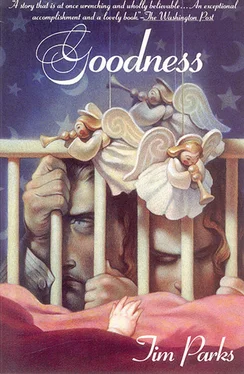‘You always set such store by normality,’ she says.
‘I should hope so.’
‘We’ve lived without it before one way or another.’
I say there’s hardly any point in bringing that up. That was an aberration. We’ve got over it.
‘And this is a tragedy.’
‘Right, so we’ve got to get over this too.’
She finds her wan smile. ‘George, you don’t “get over” tragedies. Haven’t you got it into your head yet that this has really happened?’
I remark that we would serve the little girl better if we argued about the matter logically without attacking each other. Anyway it is she, it seems to me, who is refusing to find out what’s happened or to look into it in any way, while I’ve been all over the place consulting authorities and books and talking to specialists and so on.
‘But it’s not the kind of thing you need books and experts to help you understand. It’s simple, you just sit and look at it.’
We stare at each other. Her face is drained, thin, but with a kind of luminous serenity to it. Which is new.
‘They said if they did the operation she might be able to walk, they might be able to fix everything.’
‘They said not to raise our hopes. You can’t refuse to live with things just because they’re not normal.’
‘We were so together, Shirley,’ I plead, ‘before she was born. We were so happy. Weren’t we? If only they can sort her out, everything will come right between us.’
‘It’s a chimera.’
‘But how can you know?’
‘Because they’d never have offered an operation if you hadn’t bothered them so much.’ And she says: ‘I don’t want her hurt any more than she is now. God knows what they’ll do when they start cutting. She’ll be strapped up for months. Nor do I see why we have to operate on her to improve our relationship. Which is fine as it is.’
My mother comes round and over tea and angel buns, brought in a biscuit tin I remember from earliest childhood, she begins to say what marvellous marvellous things surgeons can do these days. She’s been praying so hard and it’s true that the Lord is capable of revealing himself through science, His healing powers. She is sure it will come good.
Shirley asks how Grandfather is and says I really ought to go and visit him.
I phone Mr and Mrs Harcourt, Charles and Peggy, and get all of them to put pressure on Shirley. Everybody is on my side. Everybody supports the quick fix-it drama of orthopaedic surgery. Intervene, is the general chorus, do something about this wrong child, heal her, quick. And they are right. If the doctors are offering hope, who are we not to grasp at it? What kind of life could I have without it? Every time I come face to face with Shirley’s entrenched fatalism, her ‘accept, learn to live with it’, I find myself feeling quite sick. I know I’ll break down. I know that this is not my life.
The day before the operation Hilary smiles for the first time. She smiles and keeps on smiling. She beams from an apple-red complexion lying in a carrycot on the living room sideboard. The sight of this personality shining out of the so slightly strange face is at once immensely exciting, and distressing.
The same afternoon Mother phones to say that Grandfather is speaking again. They are moving him to a rehabilitation ward. ‘He asked after you.’
‘Oh really. What did he say?’
I notice that I’m not flinching at all.
‘Just your name. He’s not very coherent. Oh, and he asked for his pipe of course.’
‘Are you pleased?’
‘What do you mean? Yes of course I’m pleased. I was thinking perhaps it’s a good omen for Hilary’s op, love.’
Occasionally she does give away that it’s all pure superstition.
Hilary is ten hours in the operating theatre, far longer than they planned. Afterwards the doctors aren’t even encouraging. The assistant surgeon, with a frankness I have come to prefer to the usual flustering for an improbable sensitivity, says he didn’t find a single bloody tendon he honestly recognised. Coming out of anaesthetic in the early hours, the child begins to have very severe fits, contortions, retching. Shirley phones me towards midnight, fearing she is going to die. I drive back to the hospital and we pass the dawn pacing a corridor and occasionally peeping in at a now heavily sedated baby.
In the morning I drive straight from Great Ormond Street to InterAct which has its offices in Hammersmith now. I press for extra sugar and look out through dirty panes at the huge black thrust of the Cunard Hotel, the lively, grey-gloss bustle of a summer morning in London. I realise I have been more than half hoping through the night for the easy drama of a death which would attract sympathy from all and generally make life possible again. Even now I imagine Shirley calling and telling me it is all over; I think how careful I will be to express no sign of relief. On my Filofax, to some unknown deity, I write the word: PLEASE.
How Do You Feel About Your Life?
Grandfather has accused me of trying to kill him. The nurses are assuring Mother this kind of delusion is entirely normal, indeed is one more reason why he really ought to be in a home now. I say perhaps I shouldn’t visit if it is going to disturb him.
So at least that side of the story seems to be working out happily enough. After just a few weeks on her own, Mother is already in better form than I can remember and since Shirley is out day and night at the hospital and seems likely to be so for some time to come, I accept her offer to come over to Hendon and cook for me. Thus when I get home of an evening she will more often than not be in the kitchen arguing with Charles about unilateral disarmament or euthanasia or privatisation, since Charles seems to be treating us almost as a home from home now (I really can’t understand this). He will be sitting at table eating biscuits while she fusses with the oven or over the sink. Sometimes she brings a Filipino girl along to help, one of the walking wounded, a battered wife I think. She’s a slip of a girl, dark, with a kind of furtive, injured beauty about her which I find rather attractive, though she never lets me get beyond the merest pleasantries before scuttling off to wherever her sad existence is based.
Despite the desperate situation at the hospital, this turns out to be really quite a pleasant time for me. A sort of hiatus. I’m waited on hand and foot. The house is calmer than when Shirley is around. There are even flowers Mother has picked from the garden, inexpertly arranged, but soothing all the same. Flowers are so alive and fresh in their stillness. Indeed, I can’t remember when I last felt so free of tension. And after Charles has finally pushed off with his politics and endless advice, and Shirley has called with the evening’s last bulletin on Hilary’s condition, Mother and I will have the most amicable mother-and-son conversations.
‘Hasn’t got over the fits yet?’ she enquires. Her knitting needles click along the edge of a tiny sky-blue cardigan. Cardigans will be easier she thinks if the child has difficulty bending her arms. How easily she thinks these thoughts! Knitting she hums softly. Hymns. I recognise: ‘Oh God our help’, ‘Lo, He comes’, ‘Immortal, invisible’. Quite.
I’ve got the TV controls in my hand and, flicking back and forth through channels from the sofa, surprise myself by reflecting that had I married my mother, or rather someone like her, all would have been well. Wouldn’t it? I would have prevented her from spreading her generosity about too carelessly and she would have looked after me and generally agreed to do what I suggested, without the constant friction one has with Shirley.
Channel 4, I see, is illustrating the progress of the Spanish Armada with animated cartoons.
Читать дальше












